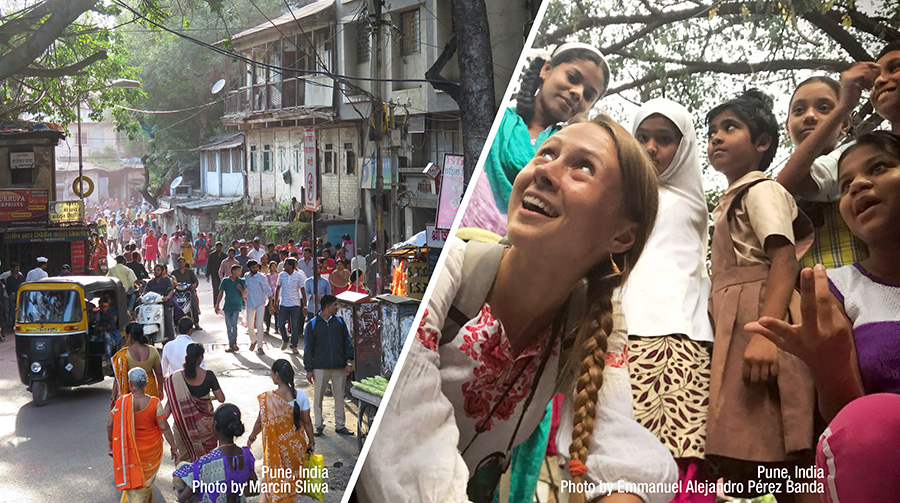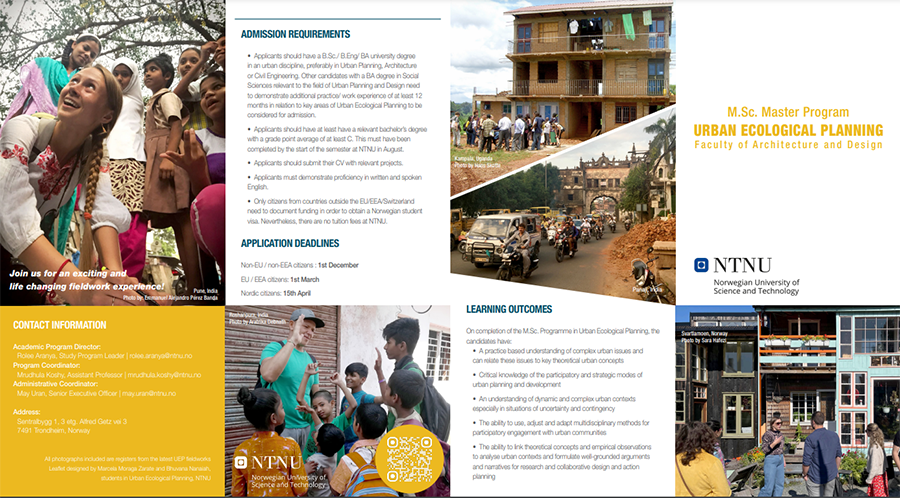What will you learn? - Urban Ecological Planning (Master's Programme)
What will you learn?

Urban Ecological Planning (UEP) is a multidisciplinary practice-based program for future urban professionals that focuses on leaving no one behind, particularly in rapidly changing social, cultural, political, and environmental contexts. Candidates gain experience in managing community and citizen engagement processes, planning for uncertainty, combining social and environmental solutions, and bridging research and practice.
Urban planners are responsible for creating and implementing plans and strategies that guide the growth and development of urban areas. They play a critical role in addressing some of the most pressing issues of our time, such as climate change, rising inequality, and access to housing and services. The program stresses an integrated approach to strategic spatial change, with a specific focus on participatory, inclusive, and developmental planning practice. We believe that the only way to address urban challenges effectively is by working directly with communities at an appropriate scale, that people are best placed to understand and respond to challenges in their own areas, and that incremental change can best meet people’s livelihood needs over time.
UEP approach is relevant to urban realities in both developed countries and the Global South. Developed countries face challenges such as aging and declining population, health hazards and exclusion of ethnic minorities. Low- and middle- income regions struggle with rapid population growth, socio-spatial inequalities, deficient infrastructure, environmental degradation, and weak institutional capacity. All contexts in the Global North and South will be heavily influenced by climate change. Consequently, the program focuses on the complex interdependence between people, institutions, and the built environment in pursuit of equity, efficiency, and sustainability.
Main areas of study

Various aspects of informality in urban areas

Planning in situations of crisis, such as natural disasters and post-conflict reconstruction

Institutional alternatives for planning in resource scarcity

Access to land, housing and basic services for the urban poor

Participatory processes in planning for excluded and marginalised communities
Degree in Urban Planning
In the first semester, students spend around 6-8 weeks on fieldwork, typically abroad, to understand the strengths of neighbourhoods within cities, and evaluate possibilities for spatial, environmental and livelihood improvements. In subsequent semesters, the students undertake various other courses designed to address theoretical and practical aspects of urban planning and to further progress in achieving the Sustainable Development Goals defined by the United Nations.
A degree in UEP can put you in a unique position to address some of the world's most pressing challenges – including poverty, climate change and urban growth. You will:
- Gain an understanding of complex urban issues and relate these issues to key theoretical concepts in planning and international development;
- Be able to plan in the face of uncertainty and contingency
- Thrive in multi-disciplinary and cross-cultural teams, and
- Build you competencies for a rewarding career that makes a difference.
Read more about the Urban Ecological Planning study programme in our brochure (PDF)
Learning outcomes
Learning outcomes
Learning outcome
Knowledge
The candidates
- Have a practice based understanding of complex urban issues and can relate these issues to key theoretical concepts in urban theory, urban planning, theories of urban poverty, livelihood and marginalisation of social and political ecology and development theory;
- Have critical knowledge of the participatory and strategic modes of urban planning and development.They can reflect on their own role as urban experts, especially concerning professional and ethical positions in situations that require mediation of interests, the protection of marginalised groups or the implementation of social rights
- Have adequate knowledge of current international charters, norms, goals and policies such as the Sustainable Development Goals and the New Urban Agenda, that guide urban planning and development policy and practice;
- Have a decent understanding of dynamic and complex urban contexts especially in situations of uncertainty and contingency experienced due to global challenges such as natural and man-made disasters, climate change, economic crises etc.
Skills
The candidates have the ability to:
- Apply multidisciplinary methods for participatory engagement with communities,through, for example, methods for trust building, data gathering, generation of ideas as well as co-design of strategic action;
- Link theoretical concepts with empirical observations to understand urban contexts and formulate well-grounded arguments and narratives for research and collaborative design and action planning;
- To independently conceptualize, structure and undertake an academic research project based on primary empirical information which is analysed and synthesized into findings, following codes of ethical practice and research;
- Adequate familiarity with media and digital tools that are relevant for present-day practice;
- Conceptualise, formulate, structure and evaluate projects, in multi stakeholder contexts, for urban development.
General competencies
The candidates have:
- A strong sense of social responsibility and can articulate clearly their own role as urban professionals engaging with critical societal challenges;
- The capacity to facilitate decision making in conflicting situations, based on professional competence and ethical maturity;
- The ability for lifelong learning in the profession and a strong motivation to apply and expand the core values of the profession
- The skills for team work in transdisciplinary, intercultural and international groups and to take leadership roles in such groups;
- The proficiency to communicate research outcomes to both academic and non-academic stakeholders.
Master Thesis Topics
UEP recognizes the diversity of fields that come together in the urban sphere, therefore the topics that are accepted for the students’ master thesis are very diverse. Explore the idea bank below to see some of the proposed topics and the study backgrounds that are relevant for these theses!
Get ideas for master thesis topics in our booklet


